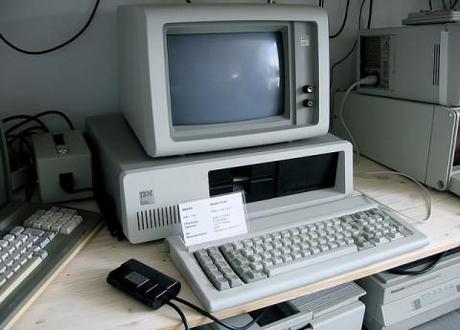
The old IBM Personal Computer. Photo credit: Marcin Wichary, http://flic.kr/p/4x17CA
Don’t panic, but it looks like computers are catching up with humans. In a statement this week, IBM said that it had developed new microchips that could learn from and adapt to their environment, something that until now has given us an advantage over our mechanical counterparts. IBM described the breakthrough, from its SyNAPSE research project, as a major departure from traditional computing concepts, and said that the chips could be used to build a new generation of “cognitive computers.”
In a statement that surely was not meant to sound ominous in any way, Dharmendra Modha, Project Leader for IBM Research, said, “These chips are another significant step in the evolution of computers from calculators to learning systems, signaling the beginning of a new generation of computers and their application in business, science and government.”
- The Man Machine? Computer engineers are extremely excited about IBM’s announcement, seeing it not just as the latest technological innovation but a potential paradigm shift. Computers may be great at simple tasks like word processing, image airbrushing and allowing us to watch videos of funny cats, but for many more complicated tasks the human brain has had the edge. Until now. As VentureBeat’s Dean Takahashi explained, “IBM’s so-called cognitive computing chips could one day simulate and emulate the brain’s ability to sense, perceive, interact and recognize…This new computing unit, or core, is analogous to the brain. It has ‘neurons,’ or digital processors that compute information. It has ‘synapses’ which are the foundation of learning and memory. And it has ‘axons,’ or data pathways that connect the tissue of the computer.”
- Adaptability. In an interview with Wired, Dharmendra Modha laid out the vision for this new approach to computer design: “We see an increasing need for computers to be adaptable, to develop functionality today’s computers can’t,” he said. “Today’s computers can carry out fast calculations. They’re left-brain computers, and are ill-suited for right-brain computation, like recognizing danger, the faces of friends and so on, that our brains do so effortlessly. The analogy I like to use: You wouldn’t drive a car without half a brain, yet we have been using only one type of computer. It’s like we’re adding another member to the family.” Let’s just hope our new relative is more Johnny 5 and less HAL 9000.
- Rise of the machines. Cognitive microchips are the latest in a series of artificial intelligence developments from IBM. In February this year, the super computer Watson beat two former human champions on the game show Jeopardy, which as PC World’s Ian Paul said at the time was “a significant leap in a machine’s ability to understand context in human language.” That victory prompted Steve Hamm, at A Smarter Planet, to predict that “in the not-too-distant future, it seems likely, [computers] will be smarter than us in a lot of ways.” This wasn’t necessarily a scary prospect, thought Hamm. “Humans have faced these kinds of challenges with each major advance in technology,” he wrote. “We create machines to do some of the things we do quicker or better of cheaper – and we figure out something else to do with out strong arms and supple brains.” He also quoted David Ferrucci, Watson’s creator, as saying that “human intelligence will continue to subsume computer intelligence – not the other way around. The Internet came along. It didn’t consume us. We consumed it.” Tell that to a billion less-productive office workers.
- Working for the man. At The Register, Timothy Prickett Morgan focused on one element of IBM’s announcement in particular: the fact that the project has received $21 million in funding from DARPA, the US Defense Advanced Research Projects Agency. If this makes you think of Skynet, you’re not alone, but Morgan saw no reason to run for the hills just yet. “Like most DARPA projects, SyNAPSE has some impressive goals and ones that may not pan out,” he wrote. Nevertheless, us humans will be paying close, if not nervous attention to SyNAPSE.

